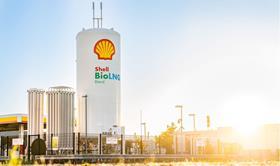Evonik and Shell are collaborating to eliminate fossil fuels from heavy duty road transport by using Bio-Liquid Natural Gas (Bio-LNG) derived from agricultural waste, with Shell giving 100 tonnes to Evonik, which is comparable to the average fuel use of three trucks per year.

Bio-LNG can reduce CO2 emissions by approximately 86 percent compared to diesel and thus contribute to reaching the EU’s 2030 climate targets.
“Working across the sector with customers and partners is the only way we will be able to change heavy duty transport sustainably” said Thomas de Boer, Vice President at Shell Commercial Road Transport.
“The collaboration with Evonik has presented the opportunity for us to jointly help drive the defossilisation of transport within the chemical sector, delivering a positive step toward the sector’s climate targets in a commercially viable way with Bio-LNG. That is very promising and good news to the sector.”
The collaboration between Evonik and Shell is part of a larger project initiated by the speciality chemicals business in January. The goal is to reduce the group’s indirect CO2 emissions from raw material and finished product transportation, with Bio-LNG providing a viable solution. Currently, 10% of Evonik’s truck transfers for packaged goods in Europe are transported in environmentally friendly vehicles. The speciality chemicals firm has set a target of growing its share of packaged products in Germany to 20% by 2025.
“With our initiative, we show that sustainable mobility with Shell Bio-LNG is already possible today” added Volker Wehber, head of Evonik’s global SEPURAN Green business for biogas membranes. “Our innovative membrane technology for efficient upgrading of biogas makes it possible to use liquefied or compressed biomethane as an alternative fuel.”
Shell offers a blend of Bio-LNG to its entire branded LNG refuelling network in the Netherlands, offering around a 30 percent reduction of carbon emissions to all customers. Furthermore, the company plans to offer a blend of Bio-LNG to its entire branded LNG network in Germany by the third quarter of 2023. To support the effort, Shell is currently building a new biogas liquefaction plant at its Energy and Chemical Park Rhineland. The plant’s 100,000-tonne annual Bio-LNG volume could help to reduce the commercial transport’s carbon emissions.
Iveco is currently covering the entire commercial vehicle range from light vans and medium-duty trucks to heavy-duty semitrailer tractors for long-distance freight transport with robust gas-powered vehicles suitable for Bio-LNG and/ or Bio-CNG.













